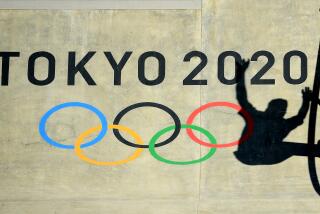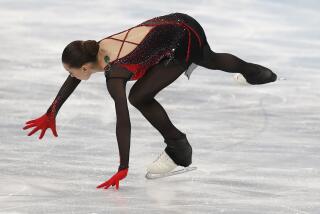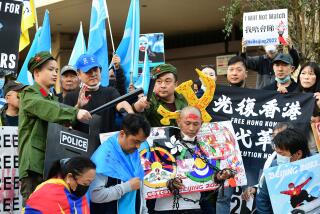IOC: Economy hits sports at grass roots
- Share via
BRUSSELS -- — While the Olympics and other major events are weathering the financial storm, IOC president Jacques Rogge is worried about the smaller sports and poorer federations.
Rogge said Friday the economic crisis is hitting hard at the grass roots and national levels of many sports, with sponsorship, government subsidies and ticket sales drying up.
“I am receiving witnesses and calls every day from many countries in the world,” he said. “They are telling me: ‘In my country there is a big problem with local clubs, with national federations.’ I cannot put a name on it, but there are many.”
Rogge said fans are less willing to pay to see anything but the top-level events.
“The sale of tickets is also diminishing at the local level,” he said. “If the economic crisis is long lasting it will damage the popularity of sport.”
Rogge, speaking at the opening of an IOC liaison office with the European Union, also said:
* Michael Phelps failed in his “duty” as a role model but deserves a second chance after being photographed with a marijuana pipe.
* The World Anti-Doping Agency is right in requiring that athletes be available each day of the year for out-of-competition drug testing despite a groundswell of protest among competitors.
Rogge said the 2010 Vancouver Winter Games and sports like soccer and track and field are popular and robust enough to withstand the economic pressures so far.
“When Vancouver put the first batch of tickets on sale, they were vastly oversubscribed,” he said. “They could have sold probably three times as many tickets. Internationally it is going well. Nationally, it is difficult.”
The reasons go well beyond sponsors pulling out in order to fall back on their core corporate tasks. Governments that have often been the lifeline for many sports across the globe also are in retreat.
“We see the first signs of governments which are diminishing the support to sport organizations because they have to bail out the banks, of course,” Rogge said at the opening of an IOC liaison office with the European Union. “The governments are in need of money. So the money goes to urgent issues and not to sports anymore.”
Phelps, who won a record eight gold medals at the Beijing Olympics, was suspended by the U.S. swimming federation for three months after a British newspaper published a photo of him at a party in South Carolina.
“Michael Phelps had a duty to be a role model,” Rogge said. “It is not just enough to win eight medals. He has a role to play for youth. He has to be an example. He failed in that.”
Phelps has apologized and vowed not to make the mistake again.
More to Read
Go beyond the scoreboard
Get the latest on L.A.'s teams in the daily Sports Report newsletter.
You may occasionally receive promotional content from the Los Angeles Times.






